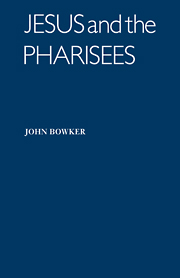Book contents
- Frontmatter
- Contents
- Dedication
- Preface
- Acknowledgements
- Abbreviations
- Note on transliterations
- Introduction
- Additional note: controversies against Sadducees and/or Boethusians
- 1 Josephus
- 2 Mishnah
- 3 Tosefta
- 4 Babylonian Talmud
- 5 Palestinian Talmud
- 6 Other rabbinic works
- 7 Megillath Ta'anith
- 8 Dead Sea Scrolls
- 9 Apocryphal works
- Bibliography
- Indexes
- Frontmatter
- Contents
- Dedication
- Preface
- Acknowledgements
- Abbreviations
- Note on transliterations
- Introduction
- Additional note: controversies against Sadducees and/or Boethusians
- 1 Josephus
- 2 Mishnah
- 3 Tosefta
- 4 Babylonian Talmud
- 5 Palestinian Talmud
- 6 Other rabbinic works
- 7 Megillath Ta'anith
- 8 Dead Sea Scrolls
- 9 Apocryphal works
- Bibliography
- Indexes
Summary
Ber. ix.5
At the close of every Blessing in the Temple they used to say, ‘For everlasting’; but after the minim [var. ‘Sadducees’] had taught corruptly and said that there is no world except one, it was ordained that they should say, ‘From everlasting to everlasting’.
Dem. ii.2f.
He who accepts on himself to be trustworthy (neʾeman), tithes what he eats and what he sells and what he buys, and does not stay as a guest with an ʿam haAreẓ. R. Judah says: ‘Even if he stays with an ʿam haAreẓ, he is neʾeman.’ They said to him: ‘If he is not trust-worthy in respect to himself, will he be in respect to others?’
He who accepts on himself to be a ḥaber may not sell to an ʿam haAreẓ anything wet or dry, or buy anything wet. He may not be the guest of an ʿam haAreẓ, nor may he receive him as a guest in his own clothes. R. Judah said: ‘Nor may he rear small animals or be profuse in vows or levity or contract uncleanness from the dead, but should minister in the bet haMidrash.’ They said to him: ‘These things do not come under the general principle (kelal).’
For general descriptions of the ḥaberim, see 3.2; 4.36; 5.5. On contact with an ʿam haAreẓ, see 3.12; 4.3. For other references to ḥaber/ḥaburah, see the Index.
Shebi. x.3,4
(A loan governed by) prozbul is not cancelled (in the seventh year of Release).
- Type
- Chapter
- Information
- Jesus and the Pharisees , pp. 99 - 115Publisher: Cambridge University PressPrint publication year: 1973



